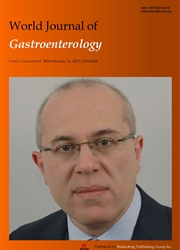

 中文摘要:
中文摘要:
AIM:To investigate the relationship between the gutliver axis and nonalcoholic fatty liver disease(NAFLD),we performed a meta-analysis to evaluate the effects of probiotic therapy in NAFLD.METHODS:We searched PubMed,Medline,Embase,Web of Science,the Cochrane Library and Chinese Biomedicine Database for all relevant randomized controlled trials on probiotics in patients with NAFLD/nonalcoholic steatohepatitis(NASH).A statistical analysis was performed using RevMan 5.0 software.RESULTS:Four randomized trials involving 134 NAFLD/NASH patients were included.The results showed that probiotic therapy signifcantly decreased alanine aminotransferase(ALT),aspartate transaminase(AST),total-cholesterol(T-chol),high density lipoprotein(HDL),tumor necrosis factor(TNF)-αand homeostasis model assessment of insulin resistance(HOMAIR)[ALT:weighted mean difference(WMD)-23.71,95%CI:-33.46--13.95,P【0.00001;AST:WMD-19.77,95%CI:-32.55--7.00,P=0.002;T-chol:WMD-0.28,95%CI:-0.55--0.01,P=0.04;HDL:WMD-0.09,95%CI:-0.16-0.01,P=0.03;TNF-α:WMD-0.32,95%CI:-0.48--0.17,P【0.0001;HOMA-IR:WMD-0.46,95%CI:-0.73--0.19,P=0.0008].However,the use of probiotics was not associated with changes in body mass index(BMI),glucose(GLU)and low density lipoprotein(LDL)(BMI:WMD 0.05,95%CI:-0.18-0.29,P=0.64;GLU:WMD 0.05,95%CI:-0.25-0.35,P=0.76;LDL:WMD-0.38,95%CI:-0.78-0.02,P=0.06).CONCLUSION:Probiotic therapies can reduce liver aminotransferases,total-cholesterol,TNF-αand improve insulin resistance in NAFLD patients.Modulation of the gut microbiota represents a new treatment for NAFLD.
 英文摘要:
英文摘要:
AIM: To investigate the relationship between the gut-liver axis and nonalcoholic fatty liver disease (NAFLD), we performed a meta-analysis to evaluate the effects of probiotic therapy in NAFLD. METHODS: We searched PubMed, Medline, Embase, Web of Science, the Cochrane Library and Chinese Biomedicine Database for all relevant randomized controlled trials on probiotics in patients with NAFLD/nonalcoholic steatohepatitis (NASH). A statistical analysis was performed using RevMan 5.0 software. RESULTS: Four randomized trials involving 134 NAFLD/NASH patients were included. The results showed that probiotic therapy signi?cantly decreased alanine aminotransferase (ALT), aspartate transaminase (AST), total-cholesterol (T-chol), high density lipoprotein (HDL), tumor necrosis factor (TNF)-α and homeostasis model assessment of insulin resistance (HOMA-IR) [ALT: weighted mean difference (WMD) -23.71, 95%CI: -33.46--13.95, P < 0.00001; AST: WMD -19.77, 95%CI: -32.55--7.00, P = 0.002; T-chol: WMD -0.28, 95%CI: -0.55--0.01, P = 0.04; HDL: WMD -0.09, 95%CI: -0.16-0.01, P = 0.03; TNF-α: WMD -0.32, 95%CI: -0.48--0.17, P < 0.0001; HOMA-IR: WMD -0.46, 95%CI: -0.73--0.19, P = 0.0008]. However, the use of probiotics was not associated with changes in body mass index (BMI), glucose (GLU) and low density lipoprotein (LDL) (BMI: WMD 0.05, 95%CI: -0.18-0.29, P = 0.64; GLU: WMD 0.05, 95%CI: -0.25-0.35, P = 0.76; LDL: WMD -0.38, 95%CI: -0.78-0.02, P = 0.06). CONCLUSION:Probiotic therapies can reduce liver aminotransferases, total-cholesterol, TNF-α and improve insulin resistance in NAFLD patients. Modulation of the gut microbiota represents a new treatment for NAFLD.
 同期刊论文项目
同期刊论文项目
 同项目期刊论文
同项目期刊论文
 期刊信息
期刊信息
